Pakisitan: Haven’t We Seen This Before?
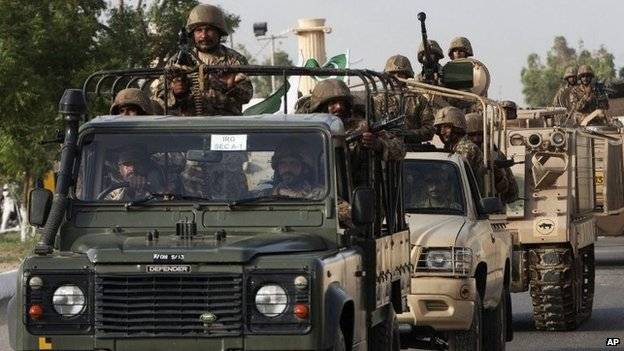
‘It looks like the Taliban have taken over the entire country.’
– Mohammad Gulfam, Karachi business owner
OH WHERE, OH WHERE HAVE THE TERRORISTS GONE?
After years of reluctance, Pakistan’s infantry and special services troops have finally moved into “militant central” – Miranshah in North Waziristan.
The town has served as the joint command-and-control centre of powerful local groups and their foreign allies in the tribal region, believed to be the last major militant sanctuary in the Afghanistan-Pakistan border region.
Troops moved in from a nearby garrison early on Monday following two weeks of aerial bombardment to soften militant targets ahead of the ground offensive. Officials had ordered the evacuation of nearly half a million people from the area to deprive the militants of “human shields”.
So what have we discovered on day one of the ground offensive?
In the absence of the media, the only source of information is the military. It has reported the killing of some “militants” in a shootout, the discovery of some tunnels and a few factories that manufactured improvised explosive devices (IEDs).
But there is no word, for example, about the top- or mid-ranking leadership of the main groups that were entrenched in the area, such as the Pakistani Taliban (TTP), the Haqqani network, the many foreigners, or the three native Waziristan-based militant groups.
Recent evidence suggests that most of these groups have already left the regions around Miranshah and the other main town in North Waziristan, Mir Ali.
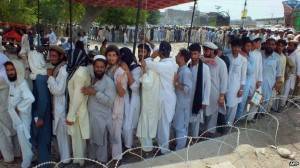
Around half a million people line up to leave the conflict zone – how many are terrorists? Nobody knows, except perhaps their ISI handlers
The most prominent among these are the Uzbek fighters allied to the TTP who claimed the 7 June assault on Karachi airport, and are believed by many to be one of the two major targets of the current operation, along with the TTP.
They are mostly believed to have slipped into Afghanistan’s Khost province after Pakistani troops left a section of the border unmanned for a couple of weeks prior to the operation.
Others who might have pulled off a similar disappearing act are the Haqqani network’s leaders. They have traditionally had sanctuaries in Khost as well as in Pakistan’s Kurram tribal district and, despite official denials, are known to have enjoyed freedom of movement through security checkpoints in the region.
Waziristan’s native Taliban and their Afghan allies still roam the vast Waziristan hinterland south and west of Miranshah. They are armed and mobile.
But their leaders – Hafiz Gul Bahadur, Bahawal Khan (alias Salahuddin Ayubi, who heads the group once led by Mullah Nazir), and Khan Said Sajna of the Mehsud faction (which has split from the TTP leadership) – have voiced no opposition to the Pakistani assault.
The Pakistani authorities, too, have not hinted that they might want to control all of this land, although they did carry out some air raids in the area possibly to hit some remnants of the TTP. The truth is, the national government has never wanted to exert its control or the apparatus of the state, including democratic institutions (when they have existed in Pakistan’s oft authoritarian past), preferring to let local warlords rule. They are realizing they cannot continue to modernize the country when part of it lives without the rule of law.
There are also no boots on the ground in the Wana region of neighbouring South Waziristan, which is part of the extended Waziristan sanctuary.
So, the overall picture is one of a military ground assault which is taking place at a time when most of the apparent “adversaries” have disappeared from the scene.
Many of them are reported to have crossed into Afghanistan and may play a potentially destabilising role there once all Nato combat troops leave by the end of the year.
For many analysts this was not entirely unexpected.
Pakistan has long been accused by its critics of trying to control Afghanistan so as to prevent its arch-rival India from using that country to open up a “second front” against Pakistan.
Pakistan has been widely accused of using militant groups as proxies to control Afghanistan and destabilise India.
But since many Islamist militants now consider Pakistan itself to be a legitimate target, analysts say Pakistan may not want the Taliban to be ascendant in post-Nato Afghanistan.
They say for Pakistan, the current operation is more about pushing the militants into Afghanistan or scattering them across the countryside instead of outright eliminating them. They believe Pakistan may still need some of these groups as leverage in Afghanistan to check Indian influence.
So Pakistan’s main objective at the moment appears to be to secure its border against a possible reverse flow of hostile groups from post-Nato Afghanistan.
But it is also trying to keep its options open – what it plans to do about those left on its soil remains to be seen.
(with contributions from agencies, the BBC)
Better late than never?
Doubts remain about the belated offensive of Pakistan’s army in North Waziristan
Jun 28th 2014 | ISLAMABAD |
FOR almost a decade American officials have moaned about the presence on Pakistani soil of an important safe haven for global terrorists, and the government’s stubborn refusal to do anything about it. A succession of American generals and diplomats have complained that the colonial-era anachronism known as North Waziristan is not just a command-and-control centre for fanatics attacking Pakistan. By providing a sanctuary for them, it has also made an outright victory against the Taliban next door in Afghanistan impossible.
Pakistan has resisted all American demands to get to grips with a place that is the most likely home of what remains of al-Qaeda’s core leadership, the base for especially lethal Afghan insurgent groups and the site where jihadists hatched the most serious plot against the American homeland since 2001—the botched car-bombing in 2010 of Times Square in New York.
None of these reasons was enough, it seemed, to coax Pakistan to take its troops inside North Waziristan out of the bases where they were locked down. Frustrated, America resorted to drone strikes to tamp down the menace, making itself even more unpopular in Pakistan.
Now, at the very fag-end of the West’s 13-year combat mission in the region, America is at last getting its wish, with the launch on June 15th of Operation Zarb-e-Azb, named after a sword of Koranic legend. Although this followed an especially provocative attack by the Pakistani Taliban, the Tehreek-e-Taliban Pakistan (TTP), on the country’s busiest civilian airport, in Karachi on June 9th, the operation had been in the offing for months. It was delayed only at the insistence of Nawaz Sharif, the prime minister, on exhausting an always improbable bid to strike a peace deal with the TTP. Mr Sharif, like many other politicians, feared terrorist reprisals in Pakistan’s ill-prepared cities, and perhaps especially in his home province of Punjab.
Hostilities had in fact begun some time ago. The army prepared the way for a ground operation with air strikes against militant hideouts, which it rather improbably claims have caused no civilian casualties. Despite this, however, little had been done to prepare for the inevitable outflow of displaced civilians. Some 450,000 have fled, including many children who will be carrying the polio virus that has been rampant in North Waziristan ever since militants banned vaccinations in 2012.
American forces grumble they were given just 72 hours warning—not long enough to put in place preparations to block the retreat of militants into Afghanistan’s volatile eastern borderlands. With NATO in the final throes of winding down operations, only air power is really available anyway. Had the operation happened years ago, Western officials sigh, foreign forces could have provided an “anvil”. The Pakistani hammer could have crushed the al-Qaeda-linked extremist groups from its own country and around the world that have come to call North Waziristan home.

Sceptics doubt how far North Waziristan will really be cleaned up even now. For all the international opprobrium it has brought Pakistan, it has also provided a base for Afghan groups regarded as useful allies in Pakistan’s decades-long effort to dominate its neighbour. It is feared many of these so-called “good Taliban” have been allowed to slip away or will not be attacked. So far, though the army has bragged of killing hundreds of terrorists, particularly Uzbeks and other foreigners, it has not boasted of strikes against groups that have never attacked Pakistan: the Afghan Taliban; the Haqqani Network; and the Hafiz Gul Bahadur group.
The army claims it is determined to eliminate all terrorists of all stripes. But the motivation for Pakistan’s change of heart is not the misery North Waziristan has brought to the world but its role in the terrible rise of domestic terrorism in recent years. Yet militant groups have infiltrated themselves across Pakistan’s heartland. So, even if it is effective, the cleansing of North Waziristan will not end terrorist atrocities elsewhere in Pakistan.
First published in The Economist.
Pakistan airport attacks: Cathay Pacific cancels Karachi flights
Cathay Pacific Airways cancels all flights from Bangkok to Karachi after deadly weekend attack
SOURCE: Reuters
The all-night battle last Sunday killed 34 people, and involved Taliban militants working in groups of two and using automatic weapons and rocket propelled grenades to inflict maximum damage. (Athar Hussain/Reuters)
Cathay Pacific Airways has cancelled all flights to the Pakistani city of Karachi from Bangkok following a Taliban raid on the country’s busiest airport this week, as top Pakistani officials debated how to tackle the escalating violence.
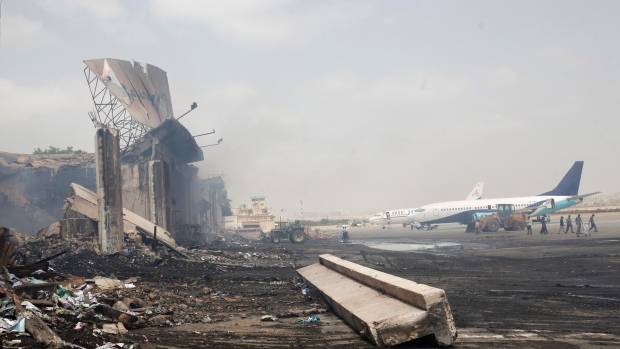
International flights in and out of Karachi have been suspended twice since Sunday, when gunmen wearing military uniforms stormed the airport, firing rocket-propelled grenades in an all-night siege that killed 34 people.
“We will continue to monitor the situation closely,” Cathay said in a statement. “Customers are recommended to check flight status before departing for the airport.”
Cathay Pacific shares closed down 0.14 per cent at about $2.04 Cnd on the Hong Kong Stock Exchange.
Airport strikes were ‘revenge’ attacks
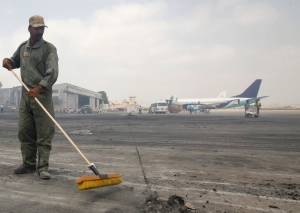
In Islamabad, Prime Minister Nawaz Sharif chaired a meeting with security officials late on Tuesday to discuss how to handle the crisis as the escalation of violence raised the prospects of an all-out army campaign against insurgent strongholds.
The Pakistani Taliban, a loose alliance of insurgent groups united by anti-state Jihadist ideology, said they had carried out the Karachi attack in response to strikes on their positions on the Afghan border.
Adding an international dimension to the events, Pakistani officials said ethnic Uzbek fighters were behind the attack and a report by a Pakistani monitoring website quoted an Uzbek commander as claiming responsibility.
“Usman Ghazi, the leader of the Islamic Movement of Uzbekistan (IMU), claimed responsibility for Sunday’s terrorist attack,” said the site, Pakistan Risk.
The IMU is a group allied with the Taliban which has often carried out attacks alongside it.
“The Uzbek militant group, which has been based in Pakistan’s tribal areas since 2002, describes the attacks as revenge for Pakistani airstrikes in North Waziristan on May 21 that targeted areas populated by Uzbek and other foreign militants,” Pakistan Risk said.
Earlier, the Taliban’s central command also claimed responsibility for the attack.
Taliban wanted to scare international airlines
Pakistan’s air force has periodically bombed Taliban hideouts in the ethnicPashtun belt straddling the border, but has yet to mount a major ground offensive there.
‘It looks like the Taliban have taken over the entire country.’- Mohammad Gulfam, Karachi business owner
Security was tight around Karachi airport and the bustling city of 18 million people remained nervous after the twin attacks, though life seemed to have returned to normal, with shops and markets open and people going about daily tasks.
“It looks like the Taliban have taken over the entire country,” said Mohammad Gulfam, who owns an electrical appliances shop in Karachi.
“What we want is that the army should carry out a big operation to clear out all the country, so that the public can get some peace of mind.”
The Taliban’s goal was to scare off international airlines from an airport serving Pakistan’s economic and financial nerve centre, said Imtiaz Gul, a security analyst in Islamabad, the capital.
Some of the Taliban militants were dressed as airport security to ensure confusion among the government’s forces. (Athar Hussain/Reuters)
“They (militants) came with a certain design to take an aircraft and passengers hostage and create a scene which would have lasted for many days,” Gul added.
“It would have put Pakistan in the international spotlight. That would have meant that foreigners and foreign airlines flying to Pakistani should stop doing that.”
Sunday’s assault all but destroyed prospects for peace talks between the Taliban and Sharif’s government, after months of failed attempts to engage the al-Qaeda-linked militants in dialogue on how to end years of violence.
The Pakistani Taliban are allied with the Afghan militants of the same name and share a similar jihadist ideology.
But they operate as a separate entity, focused entirely on toppling the Pakistani state and establishing strict Islamic rule in the nuclear-armed nation, whereas the Afghan Taliban are united by their campaign against invading foreign forces.
AIRPORT ATTACK SHOWS TALIBAN’S STRENGTH IN PAKISTAN
Coming just days after a deadly terrorist attack on Pakistan’s busiest airport in Karachi, the latest incident underscores the government’s difficulties in dealing with the militant Taliban, who are seeking to impose Islamic rule on the nation.
Security forces managed to quickly repulse Tuesday’s attack on the complex, which serves as a training academy for airport security forces, officials told the Associated Press. The attack briefly suspended flights in and out of the airport.
Pakistani television stations showed images of security guards rushing to the scene and frantically taking up positions behind buildings or earthen berms in the neighborhood less than a mile from Karachi’s Jinnah International Airport. The Pakistani military said army troops were sent to help the security forces after the shooting.
A spokesman for the Airport Security Force, Ghulam Abbas Memon, said two or three gunmen tried to enter a training academy complex for security forces from two different entrances.
“Our men retaliated and repulsed” the gunmen, Memon said, adding that security forces chased the men to a drainage ditch near the academy where another firefight ensued but the gunmen managed to escape. “Now a search operation is under way.”
A spokesman for the Pakistani Taliban claimed responsibility for the shooting in a telephone call to the AP, warning it “wasn’t over yet.”
The head of Airport Security Force, Azam Khan, told Pakistani television: “The aim of the attackers was to create a panic and we shouldn’t be playing into their hands.”
The death toll from Sunday night’s siege was raised to 26 people in addition to the 10 Taliban gunmen who were either killed or blew themselves up. At least 11 members of the Airport Security Force were among those killed.
The Pakistani Taliban said the attack was in retaliation for the November killing of the militant group’s leader in a U.S. drone strike and vowed to continue a campaign of terror.
Fear is part of the militants’ game plan, said Raza Rumi, senior fellow at the Jinnah Institute, based in Islamabad and Karachi.
The Pakistan Taliban “created the desired impact — panic, terror and diversion of state machinery toward a major security breach,” Rumi said. “It also shows their power to enter sensitive and heavily guarded areas.”
He said the government will now be forced to strongly back the Pakistan army in cleaning up the North Waziristan area of the country as the presence of foreign militants endangers Pakistan’s major cities.
“I don’t think the government has a real strategy to curtail the Taliban, or even a plan to do so,” said Ayesha Siddiqa, an Islamabad-based defense and security analyst and author.
Prime Minister Nawaz Sharif started a tentative peace process with the Pakistani Taliban this year, but talks have broken down. The Pakistani Taliban, similar to the Afghan Taliban, favors strict Islamist rule.
“The peace talks were shaky from the beginning,” Siddiqa said. “Now, there is little justification to do more. But the government will continue to drag talks on out of fear that announcing a sudden end to them will activate many Taliban groups and reverse the dividend in terms of creating anxiety among those Taliban who were becoming friendly.”
Many residents in Karachi said the attacks highlight the poor security and the ineffectiveness of the government to contain militants.
“One thinks that the airport is a place where you can feel safe and secure, but unfortunately, it is as unsafe as the roads of Karachi. We are not safe anywhere in Karachi — not even in our homes,” said Usama Ahmed, 26. “We all are the victims of yesterday’s event, we all have lost close ones … or have family friends who have lost relatives.”
Sania Iqra, 31, of Karachi, said: “The government and the military should be ashamed of itself. What excuse can you give for such a security lapse? And this isn’t the first time we have seen this in Karachi … so what exactly is safe now?”
(Contributing: The Associated Press)
AIRPORT ATTACK “JUST THE BEGINNING”: PAKISTAN TALIBAN
Pakistan – The Taliban claimed responsibility for a brazen siege on Karachi’s Jinnah International Airport overnight Monday that 27 dead, saying the attack was in retaliation for drone strikes on villages in Pakistan’s troubled northwest border region.
The militant group vowed to continue their campaign.
“This is just the beginning,” Shahidullah Shahid, spokesman for the Tehreek-i-Taliban Pakistan (TTP) told the Express Tribune, a Pakistani daily.
The assault on Jinnah International Airport in Karachi, Pakistan’s sprawling commercial hub of 18 million people, all but destroys prospects for peace talks between the Pakistani Taliban and the government of Prime Minister Nawaz Sharif.
It also deals a heavy blow to Sharif’s efforts to attract foreign investors to revive economic growth and raises questions about security at the country’s main installations.
In a possible change of tack, the Taliban said their mission was to hijack a plane – a break from their usual pattern of roadside bombs and suicide bomb attacks.
“The main goal of this attack was to damage the government, including by hijacking planes and destroying state installations,” said Shahidullah Shahid, a Taliban spokesman.
The violence began just before midnight when 10 gunmen wearing military uniforms and armed with automatic rifles and rocket-propelled grenades shot their way into the terminal building after arriving at the cargo terminal in two mini-vans.
The militants then split into two groups, with one attacking a gate called Fokker to create a diversion and the other storming the cargo terminal, police said.
“They operated in pairs. That’s why their bodies were found lying in pairs,” said senior police officer Raja Umar Khattab, adding the militants had fired rockets at passenger planes but missed. “It seems there was some ill-planning on their part.”
Officials said no aircraft had been damaged.
Another security source said the militants were highly trained and carried large backpacks filled with dried fruit and water, suggesting they were in for a long siege.
Gun battles raged through the night until security forces regained control of the airport at dawn. Passengers were evacuated and all flights were diverted. The government said security was being stepped up at all airports.
“We need to keep extremely vigilant,” Shujaat Azeem, special assistant to Sharif on aviation, said in a statement.
The Pakistani Taliban, an alliance of insurgent groups fighting to topple the government and set up a sharia state, said they carried out the attack in response to air strikes on their strongholds near the Afghan border.
MILITANTS “APPEAR TO BE UZBEK”:PAKISTAN MILITARY
Pakistan’s paramilitary force said that the attackers were ethnic Uzbeks. Pakistani officials often blame foreign militants holed up in lawless areas on the Afghan border for staging attacks alongside the Pakistani Taliban around the country.
“Three militants blew themselves up and seven were killed by security forces,” Rizwan Akhtar, the regional head of the paramilitary Rangers, said in televised remarks. “The militants appear to be Uzbek.”
Experts say, this is a lame attempt to implicate non-Taliban actors as Sharif tries to negotiate a peace settlement in Afghanistan that would see elements of the Taliban in power. The Taliban was created by Pakistan’s ISI as a means of gaining influence in Afghanistan. When in power, the two nations acted almost as one until Pakistani dictator Parvez Musharraf was forced to ally himself with the United States, post 9/11. Many see Sharif’s attempts to negotiate a settlement as an attempt to go back to some form of the pre-9/11 relationship.
The death toll included airport security guards and workers with Pakistan International Airlines.
In separate, unrelated violence, 24 Shi’ite Muslim pilgrims were killed in a suicide attack near Pakistan’s border with Iran, an official said. A radical Sunni Moslem group claimed responsibility.
As violence spiraled, a suspected Taliban suicide bomber rammed a truck into a military checkpoint on the border with Afghanistan, killing four soldiers, military officials said.
Sharif came to power last year promising to find a negotiated solution to years of violence but after the attack on the airport, the peace process looks in trouble.
Karachi is Pakistan’s biggest city and commercial hub, home to a vibrant stock exchange, the central bank and the country’s main port. But it is also a violent and chaotic place where Taliban militants and criminal gangs operate freely underground.
At the airport, gun battles went on for five hours and television pictures showed fire raging as ambulances ferried casualties away.
At least three loud explosions were heard as militants wearing suicide belts blew themselves up.
By dawn on Monday, the army said the airport had been secured but heavy smoke rose above the building.
“Ten militants aged between 20 and 25 have been killed by security forces,” said a spokesman for the Rangers. “A large cache of arms and ammunition has been recovered from the militants.”
Peace talks between the government and the Pakistani Taliban had been failing in recent months, already dampening hopes of reaching a negotiated settlement with the insurgents, who continue attacks against government and security targets.
(with input from Reuters)
 The Global Calcuttan Magazine
The Global Calcuttan Magazine 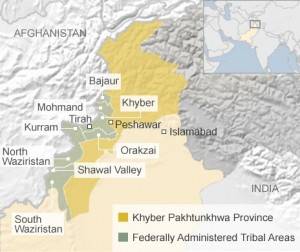
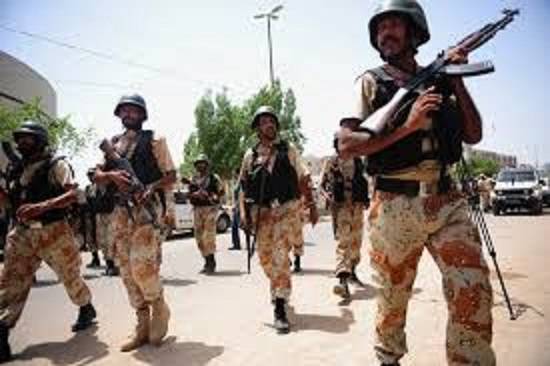
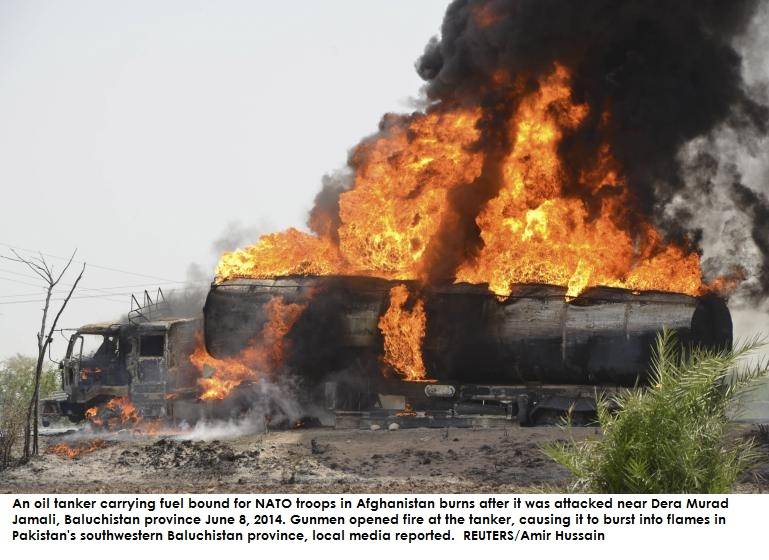
Chickens coming home to roost.